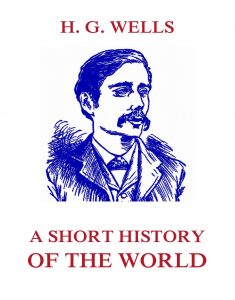A Short History Of The World – H. G. Wells
The romance of world history is Mr. Wells’ theme. Shorn of elaboration and complication, this new book forms an interesting, informing and authoritative story of man through the ages. The book is meant to be read straightforwardly almost as a novel is read. It gives in the most general way an account of our present knowledge of history shorn of elaboration and everything has been done to make it clear and vivid … to meet the needs of the busy general reader, too driven to study the maps and the time charts of other works.
Format: Paperback.
A Short History Of The World.
ISBN: 9783849672706.
Available at amazon.com and other venues.
Biographical sketch of H. G. Wells (from Wikipedia):
Herbert George Wells (21 September 1866 – 13 August 1946), usually referred to as H. G. Wells, was an English writer. He was prolific in many genres, writing dozens of novels, short stories, and works of social commentary, satire, biography, and autobiography, including even two books on war games. He is now best remembered for his science fiction novels and is often called a “father of science fiction”, along with Jules Verne and Hugo Gernsback.
During his own lifetime, however, he was most prominent as a forward-looking, even prophetic social critic who devoted his literary talents to the development of a progressive vision on a global scale. A futurist, he wrote a number of utopian works and foresaw the advent of airplanes, tanks, space travel, nuclear weapons, satellite television and something resembling the World Wide Web. His science fiction imagined time travel, alien invasion, invisibility, and biological engineering. Brian Aldiss referred to Wells as the “Shakespeare of science fiction”. His most notable science fiction works include The Time Machine (1895), The Island of Doctor Moreau (1896), The Invisible Man (1897), and The War of the Worlds (1898). He was nominated for the Nobel Prize in Literature four times.
Wells’s earliest specialised training was in biology, and his thinking on ethical matters took place in a specifically and fundamentally Darwinian context. He was also from an early date an outspoken socialist, often (but not always, as at the beginning of the First World War) sympathising with pacifist views. His later works became increasingly political and didactic, and he wrote little science fiction, while he sometimes indicated on official documents that his profession was that of journalist. Novels like Kipps and The History of Mr Polly, which describe lower-middle-class life, led to the suggestion that he was a worthy successor to Charles Dickens, but Wells described a range of social strata and even attempted, in Tono-Bungay(1909), a diagnosis of English society as a whole. A diabetic, in 1934, Wells co-founded the charity The Diabetic Association (known today as Diabetes UK).
(The text of the last section was taken from a Wikipedia entry and is available under the Creative Commons Attribution-ShareAlike License.)
Publisher’s Note: This book is printed and distributed by Createspace a DBA of On-Demand Publishing LLC and is typically not available anywhere else than in stores owned and operated by Amazon or Createspace.

